Speciation
Speciation is the process by which new species arise from existing ones. It is a central concept in evolutionary biology and is driven by various mechanisms such as natural selection, genetic drift, and mutation. Speciation occurs when populations of the same species become reproductively isolated from each other, leading to the accumulation of genetic differences over time.
Mechanisms of Speciation
There are several mechanisms of speciation, including:
- Allopatric Speciation: Occurs when a population is geographically isolated from others of its species, leading to genetic divergence.
- Sympatric Speciation: Happens when new species evolve from a single ancestral species in the same geographic area.
- Parapatric Speciation: Occurs when a new species forms in an adjacent, overlapping geographical area to the parent species.
- Peripatric Speciation: Involves a small population being isolated at the edge of the range of the parent species.
- Adaptive Radiation: When a single ancestral species rapidly diversifies into a large number of descendant species, each adapted to a specific environment or niche.
Evidence of Speciation
There are several lines of evidence that support the occurrence of speciation, including:
- Observations of divergent traits and reproductive isolation in populations over time.
- Fossil records showing the emergence of new species over the history of life on Earth.
- Genetic analyses that demonstrate genetic divergence between populations.
- Observations of ongoing speciation events in nature.
Study Guide
To understand speciation, it is important to study the following topics:
- Population genetics and the role of genetic variation in evolution.
- Mechanisms of reproductive isolation, such as prezygotic and postzygotic barriers.
- The concept of a species and how it is defined in biology.
- The role of natural selection in driving adaptive divergence between populations.
- Case studies of speciation events in different organisms, such as Darwin's finches or cichlid fish in African lakes.
By understanding these concepts and topics, you can gain a comprehensive understanding of the processes and mechanisms involved in speciation.
.◂Biology Worksheets and Study Guides High School. Cell structure and function
Worksheet/Answer key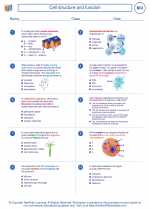 Cell structure and function
Cell structure and function  Worksheet/Answer key
Worksheet/Answer key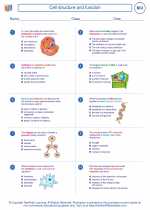 Cell structure and function
Cell structure and function  Worksheet/Answer key
Worksheet/Answer key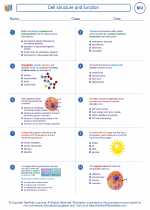 Cell structure and function
Cell structure and function  Vocabulary/Answer key
Vocabulary/Answer key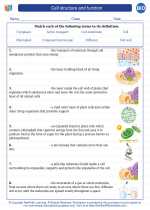 Cell structure and function
Cell structure and function  Vocabulary/Answer key
Vocabulary/Answer key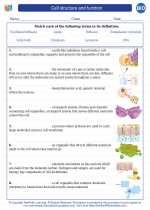 Cell structure and function
Cell structure and function  Vocabulary/Answer key
Vocabulary/Answer key Cell structure and function
Cell structure and function  Vocabulary/Answer key
Vocabulary/Answer key Cell structure and function
Cell structure and function  Vocabulary/Answer key
Vocabulary/Answer key Cell structure and function
Cell structure and function 

 Worksheet/Answer key
Worksheet/Answer key
 Worksheet/Answer key
Worksheet/Answer key
 Vocabulary/Answer key
Vocabulary/Answer key
 Vocabulary/Answer key
Vocabulary/Answer key
 Vocabulary/Answer key
Vocabulary/Answer key
 Vocabulary/Answer key
Vocabulary/Answer key
 Vocabulary/Answer key
Vocabulary/Answer key

The resources above cover the following skills:
BIOLOGY
From Molecules to Organisms: Structures and Processes
Obtain, evaluate, and communicate information to describe the function and diversity of organelles and structures in various types of cells (e.g., muscle cells having a large amount of mitochondria, plasmids in bacteria, chloroplasts in plant cells).